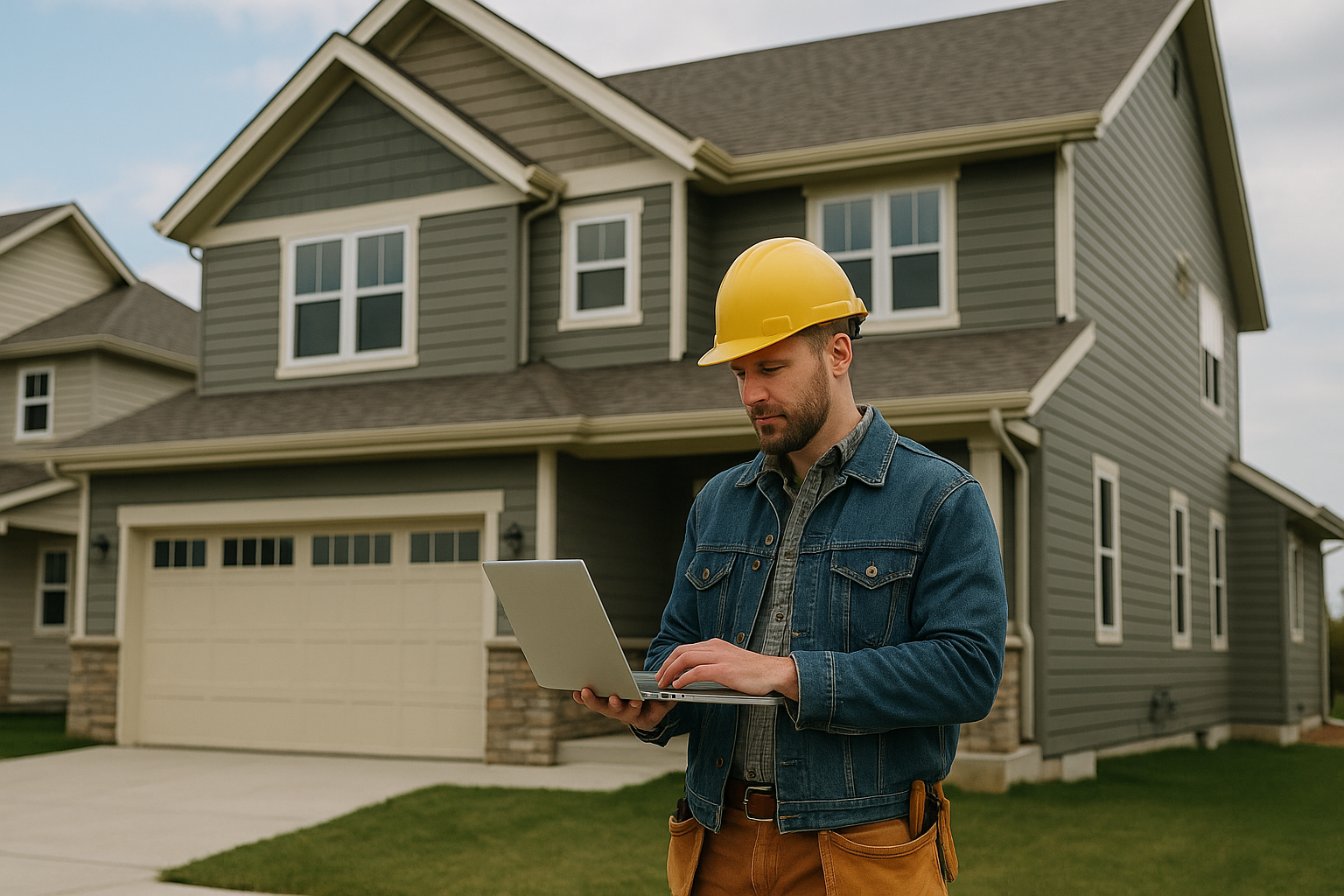Imagine a construction site in 2025—smart helmets, automated cameras, and digital dashboards guiding every decision. The rapid rise of construction ai software is completely transforming how projects are managed, from planning to execution.
With growing demand for faster, more efficient, and safer builds, companies are turning to intelligent tools that deliver real-time insights and automation. This article reviews the 7 best construction ai software solutions for 2025, helping you navigate the top choices available.
We’ll break down each option by features, pricing, benefits, target users, and pros and cons. Ready to discover which solution could revolutionize your next project?
Why AI is Transforming the Construction Industry
Complexity and scale have redefined the construction industry in 2025. Projects are bigger, timelines are tighter, and expectations around efficiency have never been higher. Companies now face intricate supply chains, more regulations, and demanding clients. In this landscape, construction ai software is quickly becoming the backbone of successful project delivery.
AI is not just a buzzword; it’s a practical solution for real-world challenges. Construction ai software helps reduce project delays, minimize cost overruns, and lower safety incidents by automating tedious tasks and providing deep, data-driven insights. Imagine having a digital assistant that predicts risks before they happen, allocates resources in real time, and flags compliance issues instantly. That’s the power of AI on today’s job sites.
The numbers tell a compelling story. According to recent AI adoption in construction industry statistics 2025, firms leveraging AI report up to 50% higher productivity and significantly fewer schedule slips. Real-world examples include AI-driven scheduling tools that adjust plans on the fly, design platforms that optimize layouts for cost and efficiency, and on-site monitoring systems that detect hazards before accidents occur.
AI’s influence stretches further with advanced features like predictive analytics for risk management and automation of repetitive tasks such as progress tracking and documentation. Here are just a few ways construction ai software is making a difference:
- Automating daily reporting and photo documentation
- Predicting equipment maintenance needs
- Optimizing materials ordering and delivery
- Monitoring worker safety through computer vision
Yet, adopting construction ai software comes with challenges. Teams must adapt to new workflows, and companies need to ensure data privacy while integrating with legacy systems. Training and change management are as critical as the technology itself.
Looking ahead, the future holds even more promise. Generative design is enabling architects to create smarter buildings, while AI-powered robotics are transforming how work gets done on site. Both large construction firms and small contractors benefit—big players gain scalability and oversight, while smaller teams get tools to compete on a new level.
| Benefit | Large Firms | Small Contractors |
|---|---|---|
| Increased Productivity | ✔️ | ✔️ |
| Cost Savings | ✔️ | ✔️ |
| Risk Reduction | ✔️ | ✔️ |
| Competitive Edge | ✔️ | ✔️ |
In summary, construction ai software is not just transforming how buildings go up—it’s reshaping how the entire industry thinks about efficiency, safety, and growth. The journey has just begun, and those who embrace AI today will lead the way tomorrow.
7 Best Construction AI Software Solutions for 2025
Selecting the right construction ai software can be a game-changer for your business in 2025. With the rapid evolution of the industry, firms are seeking platforms that balance innovation, ease of use, scalability, integration, support, and return on investment. As the AI in Construction Market Size, Share & Industry Report 2032 highlights, the global construction ai software market is projected for significant growth, making it crucial to choose the right solution for your needs.
Below, we review the 7 best construction ai software solutions for 2025. Each is evaluated on core features, pricing, benefits, target users, and pros and cons. Whether you're a large contractor or a specialized sub, you'll find an option that fits your workflow and ambitions.
Buildots
Buildots stands out among construction ai software for its advanced automated progress tracking. Using AI-powered helmet cameras, the platform captures site conditions and delivers real-time analytics, making project management more data-driven and transparent.
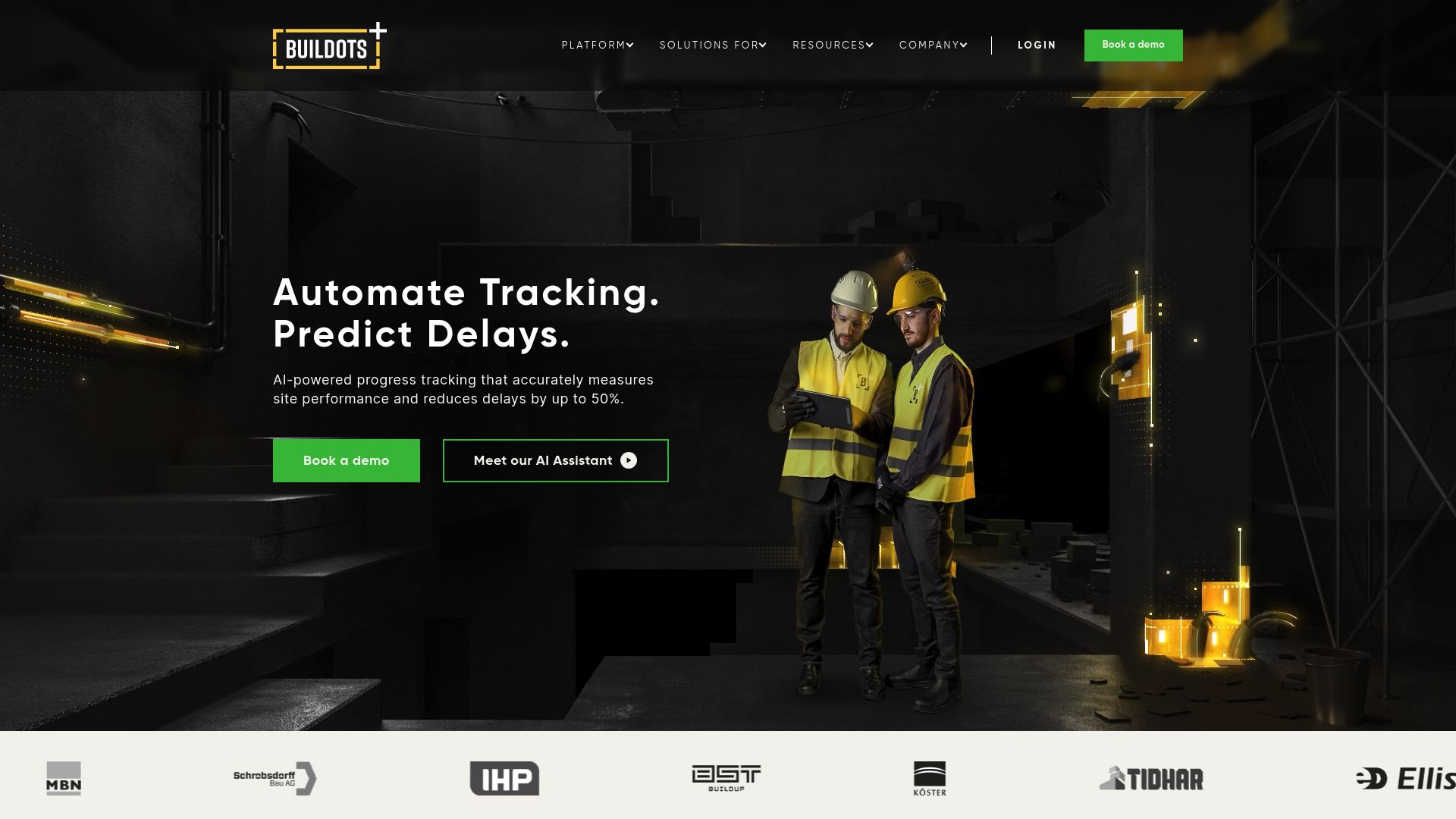
Pricing: Custom pricing based on project size ensures flexibility for each client.
Core Features:
- Automated construction progress tracking with helmet-mounted cameras.
- Real-time project analytics with actionable insights.
- Seamless integration with BIM workflows.
Key Benefits:
- Reduces rework and costly mistakes.
- Improves schedule adherence by highlighting delays early.
- Enhances transparency for all stakeholders.
Target Audience:
- Large general contractors.
- Project managers.
- Construction owners seeking robust oversight.
Pros:
- Intuitive dashboards simplify tracking.
- Reduces manual site inspections.
- Strong BIM integration for streamlined data flow.
Cons:
- Best suited for large-scale projects.
- May require dedicated training for optimal results.
For teams seeking highly automated construction ai software, Buildots delivers powerful oversight that can transform project delivery.
OpenSpace
OpenSpace is a leader in construction ai software for 360° site capture and automated progress tracking. Its AI-powered photo documentation accelerates site recording and enhances collaboration.
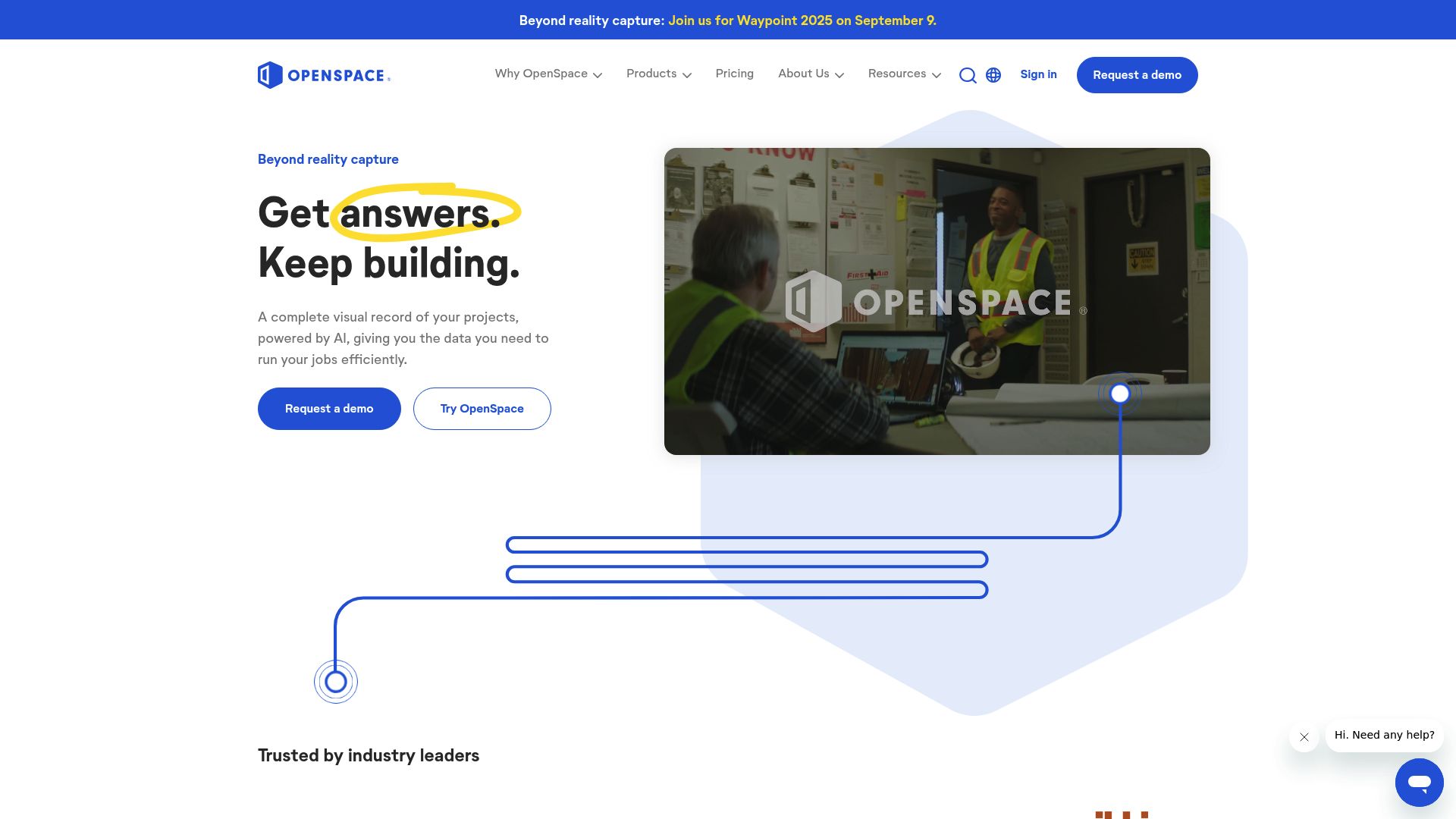
Pricing: Subscription-based, with custom quotes tailored to each project’s needs.
Core Features:
- 360° site capture for comprehensive visual records.
- Automated progress tracking powered by AI.
- Mobile app for on-the-go documentation.
Key Benefits:
- Speeds up documentation, reducing time spent on manual site walks.
- Simplifies remote collaboration, ideal for distributed teams.
- Boosts accountability with consistent visual records.
Target Audience:
- General contractors.
- Subcontractors.
- Owner’s representatives.
Pros:
- Fast image processing.
- User-friendly interface.
- Mobile-friendly for field teams.
Cons:
- Requires regular site walks for full coverage.
- Integration with legacy tools may need additional effort.
OpenSpace is an excellent construction ai software choice for companies prioritizing visual documentation and collaboration.
Procore Construction Intelligence
Procore Construction Intelligence brings predictive analytics to the forefront of construction ai software. It empowers firms to proactively manage risk and make data-driven decisions.
Pricing: Tiered subscription starting from $375/month, scaling with features and users.
Core Features:
- Predictive analytics for identifying project risks.
- Real-time dashboards and comprehensive reporting.
- Project benchmarking for continuous improvement.
Key Benefits:
- Enables proactive risk mitigation.
- Supports smarter, data-backed decision making.
- Improves project outcomes through actionable insights.
Target Audience:
- Mid-to-large construction firms.
- Project executives.
- Data analysts seeking advanced analytics.
Pros:
- Seamless integration with the Procore platform.
- Robust customer support.
- Detailed, customizable reports.
Cons:
- Steep learning curve for advanced analytics.
- Higher cost may deter smaller teams.
For organizations already invested in Procore, this construction ai software module adds a powerful intelligence layer for maximum project control.
Autodesk Construction Cloud – Construction IQ
Autodesk Construction Cloud’s Construction IQ is a powerful construction ai software platform focused on risk analysis and quality control. It leverages AI to predict safety incidents and highlight quality issues before they escalate.
Pricing: Included with select Autodesk Construction Cloud subscriptions, making it accessible for existing Autodesk users.
Core Features:
- AI-driven risk analysis and safety prediction.
- Quality control insights and automated alerts.
- Deep integration with Autodesk’s ecosystem.
Key Benefits:
- Reduces safety incidents by identifying hazards early.
- Improves compliance and quality assurance.
- Delivers actionable recommendations for project teams.
Target Audience:
- General contractors.
- Safety managers.
- Project engineers.
Pros:
- Scalable for enterprise use.
- Actionable, data-driven insights.
- Leverages Autodesk’s robust toolset.
Cons:
- Requires commitment to the Autodesk ecosystem.
- Setup can be complex for new users.
This construction ai software is ideal for teams looking to elevate safety and quality across large, multifaceted projects.
Doxel
Doxel takes construction ai software to the next level with autonomous site monitoring using robots and drones. Its AI analyzes site progress and quality, offering real-time deviation detection.
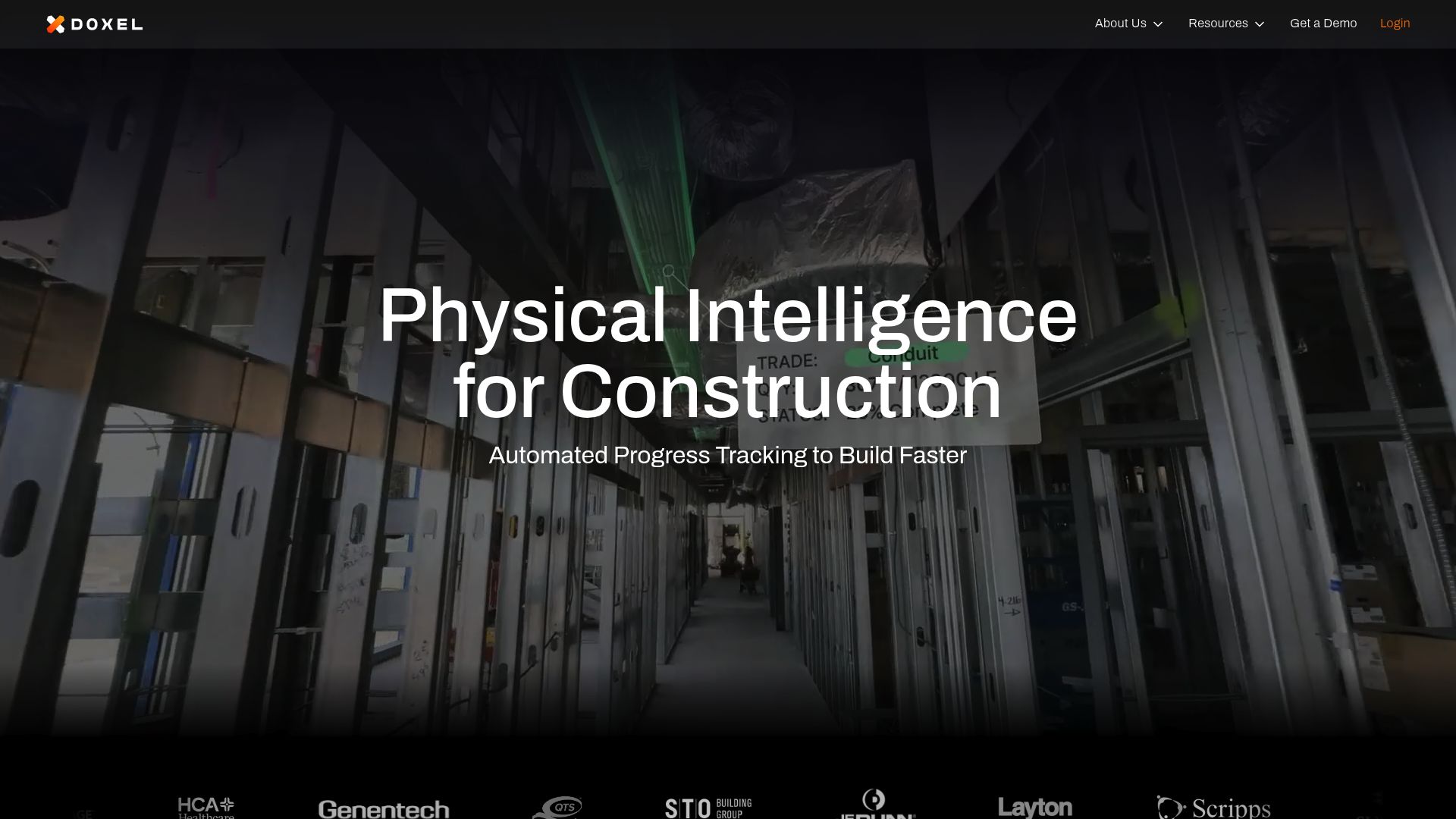
Pricing: Custom, project-based pricing, tailored to the size and complexity of your site.
Core Features:
- Autonomous robots and drones for site monitoring.
- AI-powered progress and quality analytics.
- Real-time deviation alerts to minimize delays.
Key Benefits:
- High accuracy in progress tracking.
- Reduces manual inspections and human error.
- Improves productivity by catching issues early.
Target Audience:
- Owners and large contractors.
- Infrastructure project teams.
Pros:
- Innovative hardware integration.
- Reliable, real-time insights.
- Significant reduction in project delays.
Cons:
- Hardware investment required.
- Best suited for large, complex construction environments.
Doxel is a standout construction ai software for firms ready to blend AI with robotics for next-level site intelligence.
ALICE Technologies
ALICE Technologies is a pioneer in AI-powered scheduling within construction ai software. It empowers planners to simulate scenarios and optimize resources for complex projects.
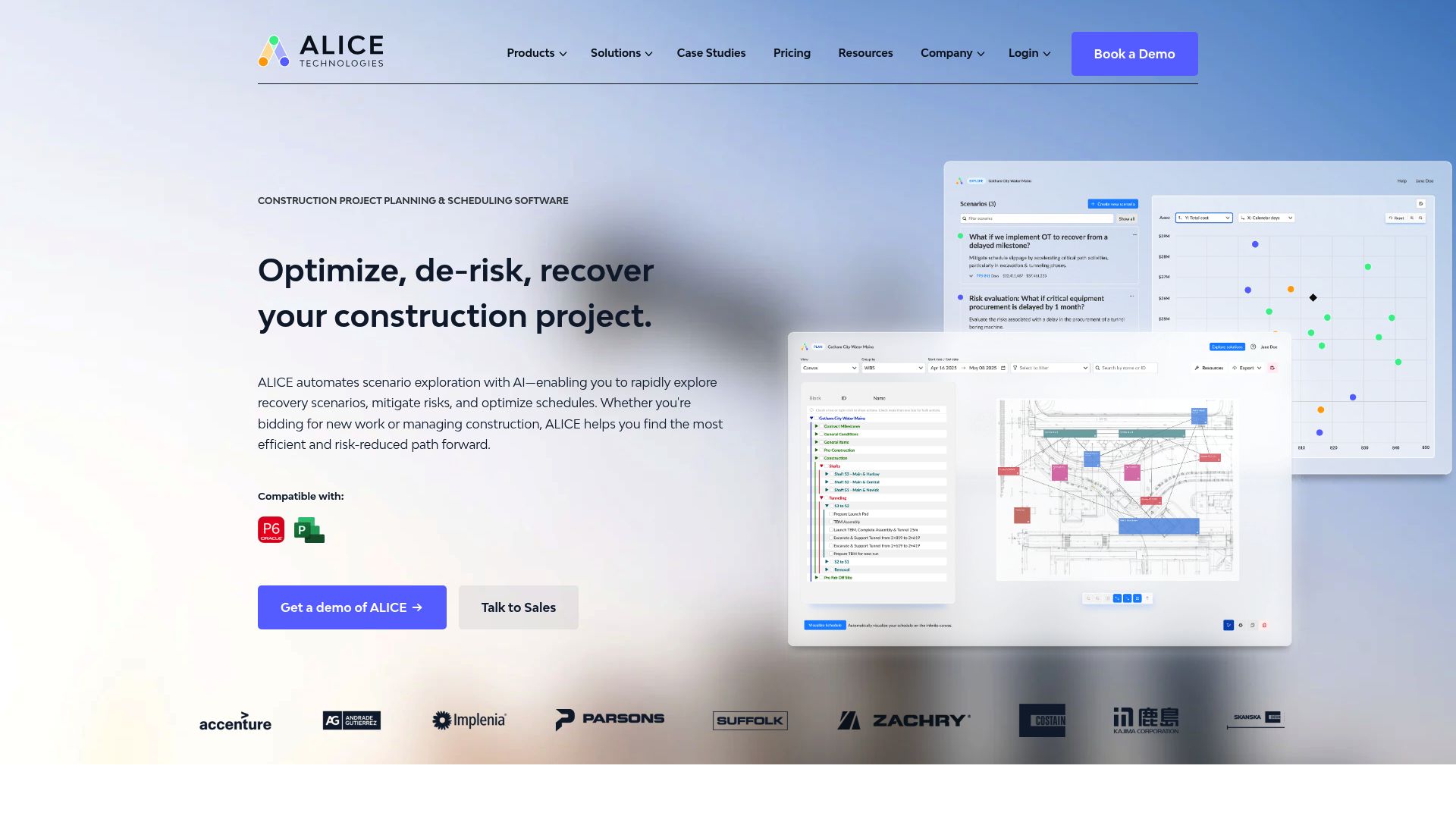
Pricing: Custom enterprise pricing, reflecting the advanced capabilities provided.
Core Features:
- AI-driven construction scheduling and scenario simulation.
- Resource optimization for labor, equipment, and materials.
- Dynamic risk mitigation tools.
Key Benefits:
- Accelerates project planning and execution.
- Optimizes allocation of resources.
- Delivers proven ROI by reducing delays and overruns.
Target Audience:
- Planners, schedulers, and project managers.
- Large-scale construction and infrastructure teams.
Pros:
- Powerful scenario planning.
- Significant time and cost savings.
- Supports complex, multifaceted projects.
Cons:
- High learning curve for new users.
- Best suited for large, complex builds.
For those seeking construction ai software that redefines scheduling, ALICE Technologies offers unmatched simulation and optimization.
Toggle
Toggle specializes in automating rebar fabrication and assembly, making it a unique construction ai software for concrete contractors and infrastructure specialists.
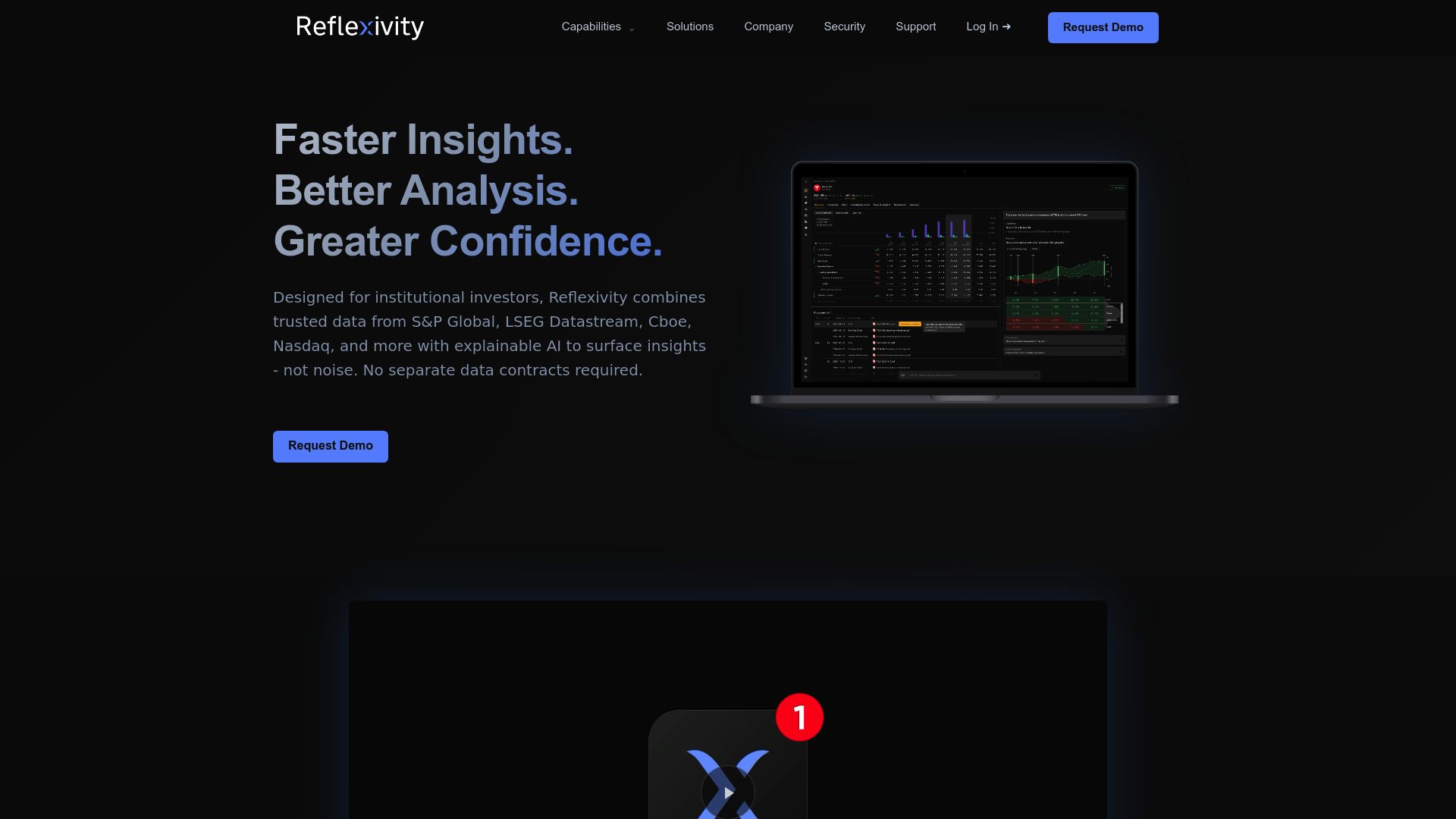
Pricing: Project-based; contact for a tailored quote.
Core Features:
- AI-driven rebar fabrication and assembly automation.
- Integration with robotics for precision work.
- Optimized workflows for concrete construction.
Key Benefits:
- Cuts labor costs significantly.
- Increases precision and repeatability.
- Speeds up concrete and rebar-related work.
Target Audience:
- Concrete contractors.
- Infrastructure builders.
- Prefabrication specialists.
Pros:
- Scalable robotics integration.
- Improved site safety.
- Significant labor and time savings.
Cons:
- Niche application focused on rebar.
- Requires adaptation of existing workflows.
Toggle is a specialized construction ai software solution perfect for teams looking to automate and streamline concrete work.
Comparison Table: 7 Best Construction AI Software Solutions
| Software | Core Focus | Pricing | Best For | Standout Feature |
|---|---|---|---|---|
| Buildots | Progress Tracking | Custom | Large Contractors | Helmet Camera Automation |
| OpenSpace | 360° Site Documentation | Subscription | Contractors, Owners’ Reps | Fast Image Processing |
| Procore Construction Intelligence | Predictive Analytics | From $375/month | Mid-to-Large Firms | Procore Platform Integration |
| Autodesk Construction IQ | Risk & Quality Analysis | With Subscription | Contractors, Safety Managers | Safety Prediction |
| Doxel | Autonomous Monitoring | Custom | Owners, Infrastructure | Robots & Drones |
| ALICE Technologies | Scheduling Optimization | Custom Enterprise | Planners, Project Managers | Scenario Simulation |
| Toggle | Rebar Automation | Project-Based | Concrete Contractors | Robotics-Driven Fabrication |
With these top construction ai software options, you can unlock new levels of efficiency, safety, and profitability—no matter the project size or complexity. Comparing their features side by side ensures you find the best fit for your team’s unique needs.
Key Considerations When Choosing Construction AI Software
Selecting the right construction ai software is a strategic decision that can shape your project's efficiency and success. With so many solutions available, it's essential to look beyond flashy features and focus on what truly fits your business.
Assessing Your Business Needs
Start by analyzing your company’s size, the types of construction projects you handle, and your typical workflows. Not all construction ai software is created equal—some are tailored for large enterprises, while others cater to small contractors or specialty trades.
- List your must-have features: progress tracking, scheduling, safety monitoring, or resource management.
- Consider your team’s technical proficiency and openness to new technology.
- Think about your future growth and whether the software can scale with your business.
Pinpointing these needs ensures you choose a solution that aligns with your goals, not just current trends.
Evaluating Integration and Compatibility
Integration is a cornerstone when adopting construction ai software. Your new tool should work seamlessly with your existing BIM, ERP, and project management platforms. Look for solutions with open APIs and pre-built connectors.
- Evaluate whether the software supports popular file formats and standards.
- Check compatibility with mobile devices and remote collaboration tools.
- Assess vendor responsiveness to integration requests.
For more on how the industry is navigating integration and AI adoption, see AI in Construction Today: What the Experts Are Seeing, which highlights expert perspectives and real-world examples.
Balancing Cost, Scalability, and Support
Understanding the total cost of ownership is crucial. Construction ai software pricing often includes more than just the license.
- Factor in implementation, training, and possible hardware costs.
- Evaluate ongoing support, updates, and upgrade policies.
- Ask about scalability—can the platform handle more projects or users as you grow?
A detailed cost-benefit analysis helps avoid surprises and ensures a smooth, future-proof investment.
Testing, Training, and Change Management
Adopting construction ai software is more than a technical upgrade—it's a cultural shift. Plan for a pilot phase to test the solution on a small project before a full rollout.
- Gather user feedback and monitor for issues.
- Schedule comprehensive training for your team.
- Develop a change management plan to address resistance and ensure adoption.
Reviewing user testimonials and case studies can help set realistic expectations. Successful implementation hinges on continuous learning and adaptability.
The Future of AI in Construction: Trends to Watch
The future of construction ai software is unfolding rapidly, bringing a wave of innovation that’s reshaping how projects are planned, managed, and delivered. Contractors and project teams are seeing more tools with intelligence, automation, and connectivity than ever before. What are the most important trends to watch as we look toward 2025?
Generative Design & Project Optimization
One of the most exciting applications of construction ai software is generative design. By leveraging machine learning, teams can explore thousands of design variations in minutes, balancing cost, materials, and sustainability goals. This technology turns project optimization into a science rather than a guessing game.
AI-powered scheduling tools are also gaining steam, allowing contractors to simulate scenarios and identify the most efficient project paths. This reduces costly delays and maximizes resource allocation. As a result, both large and small firms are unlocking new levels of productivity through smarter planning and forecasting.
Robotics, IoT & Safety Monitoring
Robotics and IoT are taking construction ai software to the next level. Drones, wearable sensors, and autonomous vehicles now work alongside humans to capture real-time data and automate hazardous tasks. These innovations are making job sites safer and more efficient.
Advancements in AI-driven safety monitoring are reducing incidents by identifying risks before they escalate. According to AI use in construction is rising, new data shows, the industry is investing strategically in these technologies to raise the bar for project delivery and compliance. Expect even tighter integration between robotics, data platforms, and on-site operations in the coming years.
Sustainability & Future Projections
Sustainability is now a core driver for construction ai software adoption. AI tools are helping teams minimize energy use, reduce waste, and design greener buildings. The rise of no-code and low-code AI platforms is making these solutions accessible to more professionals, regardless of technical background.
Industry experts predict continued growth in AI-powered project optimization and environmental monitoring. As software, hardware, and data converge, the construction sector will see smarter workflows, better resource management, and a more sustainable future. With every advance, construction ai software is set to become the backbone of modern building.
As you explore these top AI solutions for the construction industry, it’s clear that choosing the right technology can make all the difference for your business in 2025 and beyond. If you’re wondering how to get started or which platform fits your team’s needs, you don’t have to figure it out alone—we’re here to help you sort through your options and grow your online presence at the same time. Let’s chat about your goals and how digital marketing and smart AI tools can work hand-in-hand for your contracting business. Schedule your Free Consultation today!
